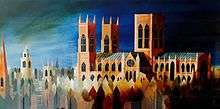Edward Kluz
| Ed Kluz | |
|---|---|
 York by Ed Kluz, 2015 | |
| Born | Suffolk, England |
| Nationality | British |
| Education | Winchester School of Art |
| Known for | painting, illustrating, and printmaking |
| Notable work |
Restoration London The Gardens at Stoke Edith Crystal Palace |
| Movement | Contemporary art |
| Website |
edkluz |
Ed Kluz (born August 19, 1980) is a painter, illustrator and printmaker. His work explores our relationship with the past through notions of English Romanticism. According to Kluz, "...our architectural heritage is a huge source of inspiration for me. The great edifices of the realm, past and present, have always conveyed a sense of power, which fails to dwindle with the passing centuries. Even the overgrown foundations of a long demolished country house hold a melancholic power as does the shattered body of a great abbey."[1]
The thorough research and persistent evolution of Kluz's works has brought about experimentation and innovation with various media . His earlier work explored the material qualities of egg tempera and gum Arabic on gessoed panels. Most recently he has developed a distinctive paper collage technique which makes use of hand coloured papers and mixed media. He also produces screen prints and lino cuts.
Kluz has stated that he believes in the role of the "artist as designer and embraces all forms of image making", which includes printmaking, textile design, illustration and painting.[1]
Early life
Kluz, the eldest of three children, was born in Ipswich, Suffolk on August 19, 1980 and grew up in Swaledale, North Yorkshire. His parents, Andy (TV broadcaster) and Liz Kluz bought a derelict late 18th century farmhouse in the tiny hamlet of Applegarth near the Yorkshire town of Richmond in 1985.
Education
Kluz studied fine art painting at the Winchester School of Art between 1999 and 2002.[2] His work during this period also focused on notions of the past. In particular the relationship between early photography and painting.
Critical response
Kluz's work has received positive reviews, having been exhibited at St Jude's Gallery, The Scottish Gallery, Edinburgh, and Quercus Gallery.[1][3][4]
Kluz's work is considered significant for its ability to reimagine the past. In particular, Kluz's work has been praised for its ability to capture Romanticism in "...exploring both the creation and the destruction of Britain's great country houses."[5]
According to The Edition, "[Kluz's] skillful interpretations are awe inspiring - his buildings capture the weight of history, the precision of structure and yet the fluid, ethereal atmosphere of the surrounding landscape concur beautifully - it’s breathtaking."[6]
References
- 1 2 3 "Ed Kluz - Artist - St. Jude's Gallery". stjudesgallery.co.uk. Retrieved 2015-05-24.
- ↑ "Ed Kluz – Penfold Press". penfoldpress.co.uk. Retrieved 2015-05-24.
- ↑ "ED KLUZ - Quercus Gallery". quercusgallery.co.uk. Retrieved 2015-05-24.
- ↑ "Ed Kluz at The Scottish Gallery | All Things Considered". allthingsconsidered.co.uk. Retrieved 2015-05-24.
- ↑ "James Russell: Lost Worlds: Edwin Smith & Ed Kluz". jamesrussellontheweb.blogspot.co.uk. Retrieved 2015-05-24.
- ↑ "Artist - Ed Kluz". http://theeditionblog.tumblr.com. Retrieved 2015-05-26. External link in
|publisher=(help)